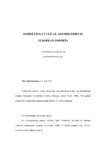Mostrar o rexistro simple do ítem
Modelling cyclical asymetries in European imports
| dc.contributor.author | Cancelo de la Torre, José Ramón | |
| dc.contributor.author | Mourelle, Estefanía | |
| dc.date.accessioned | 2024-03-12T12:58:34Z | |
| dc.date.available | 2024-03-12T12:58:34Z | |
| dc.date.issued | 2005 | |
| dc.identifier.citation | Cancelo, José Ramón; Mourelle, Estefanía (2005): Modeling cyclical asymmetries in GDP: international evidence, Atlantic Economic Journal, 33(3), 297-309. | es_ES |
| dc.identifier.issn | 1083-0898 | |
| dc.identifier.uri | http://hdl.handle.net/2183/35857 | |
| dc.description.abstract | [Abstract]: This paper applies smooth transition models to capture the nonlinear behavior in the imports data of six major European economies and to assess whether such nonlinearities are related to business cycle asymmetries. Two classes of switch between regimes are considered: endogenously determined transition that assumes nonlinearities are generated by idiosyncratic components specific to foreign trade, and exogenous transition based on GDP growth as a more direct indicator of the cyclical state of the economy. The results support the proposition that the dynamics of imports are nonlinear. In Belgium, France, Spain and the United Kingdom regimes change over the business cycle, while in Germany and Italy the switch between regimes is endogenous. National characteristics play a role in defining the position of extreme regimes, the smoothness of the transition and local dynamics within each state. | es_ES |
| dc.language.iso | eng | es_ES |
| dc.publisher | Springer | es_ES |
| dc.relation.uri | https://link.springer.com/article/10.1007/s11294-005-3011-z | es_ES |
| dc.title | Modelling cyclical asymetries in European imports | es_ES |
| dc.type | info:eu-repo/semantics/article | es_ES |
| dc.rights.access | info:eu-repo/semantics/openAccess | es_ES |
| UDC.journalTitle | International Advances in Economic Research | es_ES |
| UDC.volume | 11 | es_ES |
| UDC.issue | 2 | es_ES |
| UDC.startPage | 135 | es_ES |
| UDC.endPage | 147 | es_ES |
Ficheiros no ítem
Este ítem aparece na(s) seguinte(s) colección(s)
-
GI-C+D - Artigos [115]






